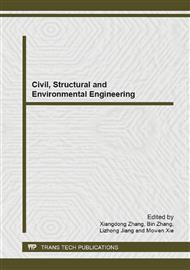p.2634
p.2639
p.2643
p.2648
p.2654
p.2658
p.2663
p.2667
p.2673
Experimental Investigation on Triclosan to Acidithiobacillus Ferrooxidans
Abstract:
Microbial activities intensified the oxidation of sulfide and acidification of coal mine waste. We had an investigation on bactericidal effect of triclosan in this experiment, taking the pH, Eh, Fe2+ oxidation rate, Fe2+ concentration and oxidation inhibition rate as the indexes. The lab experiment shows that this bactericide is effective. When they were treated by 0.05 mmol/L triclosan, most of the acidthiobacillus ferroxidans were deactivated. Bactericide techmology could promote the revegetation of coal mine waste and reach the goal of controlling the source pollution.
Info:
Periodical:
Pages:
2654-2657
Citation:
Online since:
November 2013
Authors:
Price:
Сopyright:
© 2014 Trans Tech Publications Ltd. All Rights Reserved
Share:
Citation:


